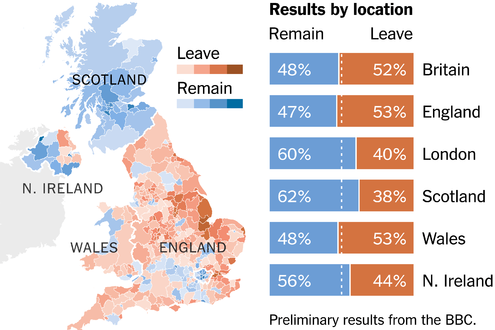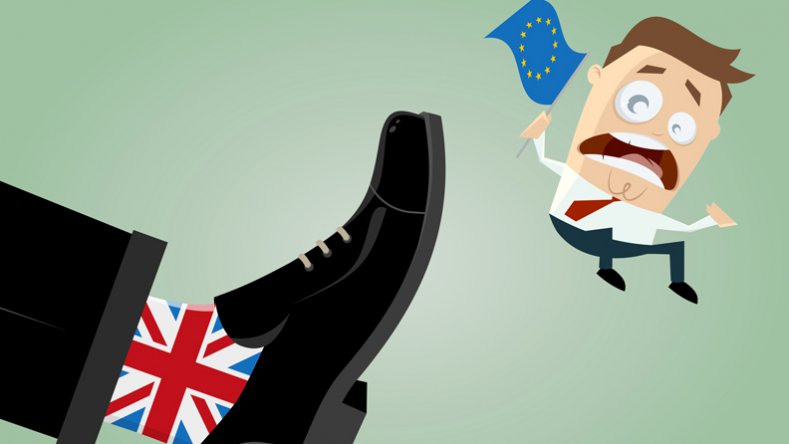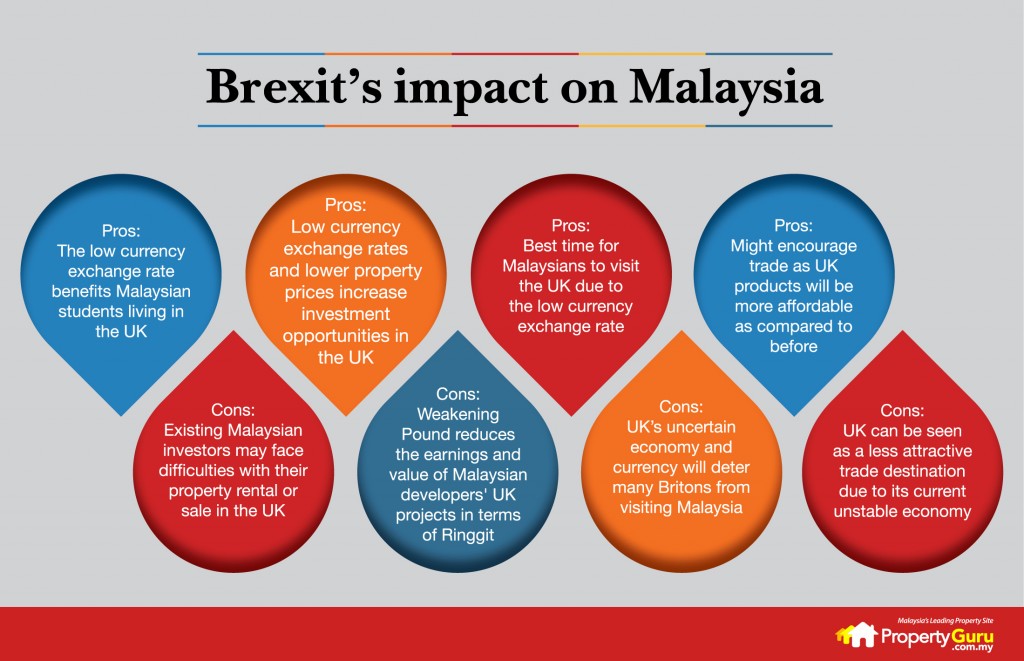The news about Brexit has been in the headlines for the past few weeks all over the world and has received major attention. If you’re wondering how Britain’s decision to leave the European Union will impact fellow Malaysians, here’s how…
History of UK and EU
The United Kingdom (UK), officially known as the United Kingdom of Great Britain and Northern Ireland, is a country that was formed by merging four former countries namely England, Wales, Scotland and Northern Ireland. Sometime UK is referred to as Britain in reference to the Isle of Great Britain which forms a big part of UK – consists of England, Wales and Scotland.
Meanwhile, the history of EU traces back to 1951 when six nations started the European Coal and Steel Community (ECSC) to recover from the devastating World War II, through duty-free trade. This alliance continued and ECSC was later changed to the European Economic Community (EEC) in the year 1958.
The community began growing and despite being rejected twice in the year 1963 and 1967 to join the EEC, Britain finally joined this pack in 1973. EEC was renamed again in the year 1993 as the European Union, which has the alliance of 28 member countries (including United Kingdom).
Due to this bloc, the member countries follow a standardized system of laws and policies to ensure free movement of people and intragovernmental decision making – benefitting each other. As time goes by, these allies became strong and started controlling the global economy.
What is Brexit all about? Brexit is the acronym for British exit!
When the Britain entered the bloc, a referendum was held two years after in the year 1975 where 67% of the residents voted to stay.
But a recent referendum held on June 23 proved otherwise when Britain made a historic decision to exit the European Union, as 17.4 million citizens voted to leave and 16.1 million citizens voted to remain.
The 52% citizens who voted to leave claimed that the EU has changed immensely over time in terms of its size and bureaucracy, and has wiped-out British influence and power. Meanwhile, 48% of the citizens voted to remain for the influence, security and economic benefit it offers.
The decision to leave EU has created many controversies.
Among the four countries in the UK, majority of people in England and Wales voted to leave, while the majority of citizens in Scotland and Northern Ireland voted to stay.
With this, there are talks about a second independent referendum for Scotland to be a self-governing country. The majority voted to stay in the United Kingdom when the memorandum was held for the first time in 2014. Meanwhile, there are also possibilities for a reunification referendum for Northern Ireland, meant to be re-united with Ireland.
The result of this referendum also might affect the immigrants working and staying in the UK. It is said that, the move to negotiate and leave EU will take about 2 years to be fully concluded.
After the result was announced, the UK Prime Minister David Cameron who leads the ‘remain’ campaign stepped down and Pound Sterling fell almost 10% on the same day – the lowest point since 1985.
How Brexit affects Malaysians?
1. Education
According to UNESCO, UK was ranked as the second best destination for education out of the top 20 countries in the world. Meanwhile, the colleges and universities in Britain have also been the top favourite choices for Malaysian students to pursue higher education.
The UK’s education sector has been predicted to remain strong regardless of Brexit and its decision to leave the EU is expected to give a positive impact on Malaysian students. The quality of education offered to the students is expected to stay the same and the low currency exchange rate is indeed beneficial to most Malaysians.
But there are several uncertainties regarding the conditional visas for those who preparing to leave for Britain, as well as the law students whom are obligated to take EU Law as one of their core subjects.
2. Foreign Investment
The rise of Malaysian students in oversea has contributed greatly to the increase in foreign property investment and has encouraged many to invest in UK’s student accommodation.
Currently, Malaysians are among the major investors in the UK, which also includes institutional investors namely the Employees Provident Fund, Retirement Fund Inc. (KWAP) and Armed Forces Fund Board (LTAT).
In regards to this, Cornerstone International Properties director Virata Thaivasigamony stated that in the year 2015, 73% of CSI clients invested in purpose-built student accommodation (PBSA) oversea. Previously, PBSA were only reserved for institutional investors.
Brexit posts both good and bad news for many. Even though the low currency exchange rate and the lower house prices widens the investment opportunities for Malaysians, yet the situation is not favourable for the existing property owners.
The possibilities for recession is still high, which might cause difficulties in terms of property rental or sale.
3. Property Developers
There are several property developers in Malaysia who have major ongoing projects or upcoming developments based in the UK. The British’s decision has created several concerns among the developers as the uncertainty about the UK’s economy created by Brexit could reduce the demand for UK properties from both Britons and foreign investors.
Besides that, the weakening Pound will also reduce the earnings and the value of the developer’s project in terms of Ringgit.
Some of the developers have decided to proceed with their project as they believe the UK will still remain as a key investment destination and financial centre in the long term. Meanwhile, some are adopting the wait and see approach.
4. Tourism Sector
In the year 2015, almost 400,000 tourists from the UK visited Malaysia and the number was increased by 2.4% in the first quarter of 2016. Yet, the number is expected to reduce further as the uncertain economy and currency will deter most British citizens from travelling abroad.
However, this poses a minimal impact on our tourism sector. The majority of tourists visiting Malaysia are from Southeast Asia and Northeast Asia regions.
As for Malaysians who wish to visit the UK, this is the best time to do so since the declining Pound will give a better currency exchange rate.
5. Others
Brexit gives less impact to Malaysia in terms of trade as the UK only contributes 1.1% out of Malaysia’s total trades. There are two possibilities of Brexit at the moment: Firstly, UK can be seen as a less attractive trade destination due to its current unstable economy; and secondly, the low currency exchange rate might encourage trade as UK products will be much cheaper compared to before.
Besides that, Malaysia has been a popular destination for foreigners to settle down due to its My Second Home (MM2H) programme. There are many British expats in Malaysia who receives British state pensions. Brexit will affect them since they will be receiving a lower pension due to the low currency exchange rate.
At the moment, the future of Britain remains unclear. But for a Malaysian the impact of Brexit is minimal, as well as beneficial in some instances.
Image credits: tourism-review.com, linkedin.com, freemalaysiatoday.com, worldtempus.com and matthewaid.com
Share this Image On Your Site
<p><strong>Please include attribution to http://www.propertyguru.com.my with this graphic.</strong><br /><br /><a href=http://www.propertyguru.com.my/property-news/2016/7/130193/impact-of-brexit-on-malaysians><img src=https://cdn-cms.pgimgs.com/news/2016/07/Brexit-Infographic_new.jpg alt=Brexit-Infographic_new width=540px border=0 /></a></p>
Mangalesri Chandrasekaran, Editor at PropertyGuru, edited this story. To contact her about this or other stories email mangales@propertyguru.com.my









